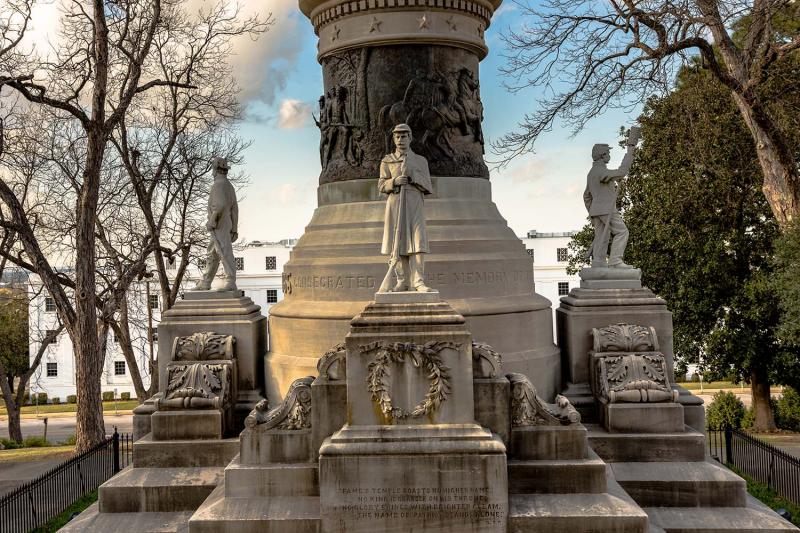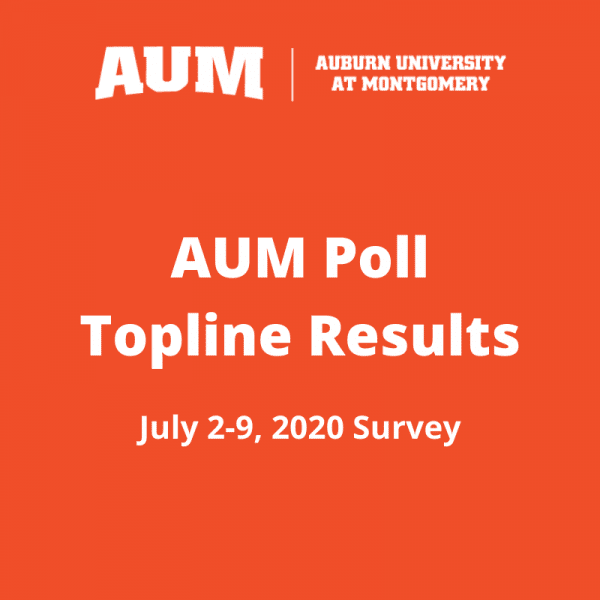Alabama voters share opinions on race relations, expansion of Medicaid and equal access to education for latest Auburn University at Montgomery Poll
Peaceful protests in response to police killings of unarmed African Americans and the demand for the removal of Confederate monuments are two of the latest issues Alabama voters shared their opinions on for a recent Auburn University at Montgomery political poll.
“A slim majority, or 52 percent, of all Alabama voters support the state legislature’s 2017 law forbidding the removal of Confederate monuments,” said David Hughes, director of AUM Poll, a new university polling initiative that canvasses voters’ opinions on political and public policy issues heading into the 2020 general election.

A key feature of the polling initiative has been to show how Alabamians stand on issues as members of the Democratic and Republican parties, said Hughes, an assistant professor of political science who specializes in American politics. Alabama voters have proven time and time again that the state is among the most conservative in the country.
The AUM Poll, which surveyed 575 registered voters July 2-9, found that while a majority of Alabama voters sympathize with protests that began across the nation and in Alabama following the death of Minnesota resident George Floyd, an African-American man killed while in police custody, there was less support among liberal voters for Alabama’s 2017 Confederate monument law.

“Upon closer inspection, AUM Poll found that 35 percent of Democrats supported the law compared to 66 percent of Republicans,” Hughes said. “The legislation was also more popular among older, less educated, and white residents.”
AUM Poll also found that 62 percent of Alabamians support peaceful protests in response to the police killings of unarmed African Americans. This includes 83 percent of Democrats compared to 49 percent among Republicans.
“Public opinion on this matter was also polarized by race with 55 percent of whites indicating their support for peaceful protests compared to 79 percent of nonwhites,” Hughes said.
AUM Poll, housed within AUM’s Department of Political Science and Public Administration, also surveyed Alabama voters on the economy, healthcare, and education, which voters rated as top issues currently facing the state heading into the 2020 election.
Hughes said the survey found clear majorities also supporting policies that expand Medicaid and that would create a state-run education lottery in Alabama.
“Significantly fewer residents rated crime, race relations, and immigration as important issues, though opinions were polarized by race,” he said. “Whites rate immigration more important than nonwhites and nonwhites rate race-relations as more important compared to whites.”
“Overall, this survey shows that while a majority of residents support policies for improving education and healthcare, peaceful protests of police brutality and a pathway to citizenship for dreamers, majorities also support state legislation banning the removal of Confederate monuments and the erection of a southern border wall.”
Expansion of Medicaid
Alabama remains one of only 13 states that has declined to expand access to Medicaid, Hughes said.
“Even before the COVID-19 pandemic, hospitals in Alabama were vulnerable to closure in part due to the state’s decision not to expand Medicaid to low income residents,” he said. “The COVID-19 pandemic has likely exacerbated problems surrounding access to healthcare given that the state’s unemployment rate last month was approximately 159 percent higher than it was the previous year.”

The AUM Poll found that approximately 13 percent of the state’s adult population lacks health insurance. Among those who are uninsured, 61 percent live in households that make less than $30,000 annually. These individuals rate the importance of healthcare approximately 16 percent higher compared to those who are insured and are approximately 32 percent more likely to support policies that expand access to Medicaid.
Hughes said a large majority of survey respondents support expanded access to Medicaid for low income Alabamians, with the driving factor being respondents’ income.
Approximately 64 percent of those surveyed supported a plan to expand Medicaid, including 84 percent of Democrats and 52 percent of Republicans. Among individuals living in households earning less than $80,000 per year, 70 percent support expanding Medicaid compared to only 45 percent of those living in households earning more than $80,000 annually.
Equal Access to Education
When asked whether every child in Alabama should have equal access to a quality public education, 63 percent of AUM Poll survey respondents agreed compared to 28 percent who disagreed.
“When asked about raising new funds for the state’s public K-12 schools, 91 percent of respondents supported at least one type of reform when presented options for increasing sales, property or income taxes, or creating a lottery run either by the state or the Poarch Creek Indians,” Hughes said.

The AUM Poll found that the only education policy to unite a majority of Alabamians is the creation of a state-run lottery to raise money for Alabama public schools.
“What’s more, this support was bipartisan,” Hughes said. AUM Poll results show 56 percent of Democrats and 55 percent of Republicans favored it.
“Large majorities of residents indicated their disapproval of a plan to give the Poarch Creek Indians a monopoly on a state lottery with only 18 percent of residents supporting this idea,” he said.
Additionally, bipartisan majorities of Alabamians opposed plans to increase sales, property, or income taxes to fund schools, though taxes targeting the wealthy were significantly more popular compared to plans targeting all Alabamians, Hughes said.
“Approximately 22 percent of respondents supported a plan to raise income or property taxes among only the wealthiest individuals while less than 10 percent of residents supported raising sales, property, or income taxes without regard to wealth,” he said.
Immigration and Border Wall
Immigration and the construction of a wall along the border with Mexico have been hot topics leading into and since the election of President Donald Trump, with conservatives overwhelmingly supporting Trump’s policies on the two issues.
“While immigration and race relations were rated as less important by most respondents, results from AUM Poll indicate this was largely due to polarized opinions,” Hughes said.
For example, 54 percent of respondents indicated their support for a wall or barrier along the southern border with Mexico. But only 18 percent of Democrats supported such a plan compared to 79 percent of Republicans, the survey found.
“In contrast to support for a border wall, a slight majority, or 54 percent, of Alabamians showed their support for a pathway to citizenship for undocumented immigrants who came to the United States as children — often referred to as ‘Dreamers,’” Hughes said.
The AUM Poll found that a total of 72 percent of state Democrats support a pathway to citizenship for Dreamers with no criminal record compared to 44 percent of Republicans.
Survey Methodology
The AUM Poll surveyed 575 registered Alabama voters between July 2nd and 9th using online questionnaires. Respondents were subsequently weighted based upon target population demographics in order to ensure a representative sample. The survey has a weighted margin of error of ±5.7 percentage points.
